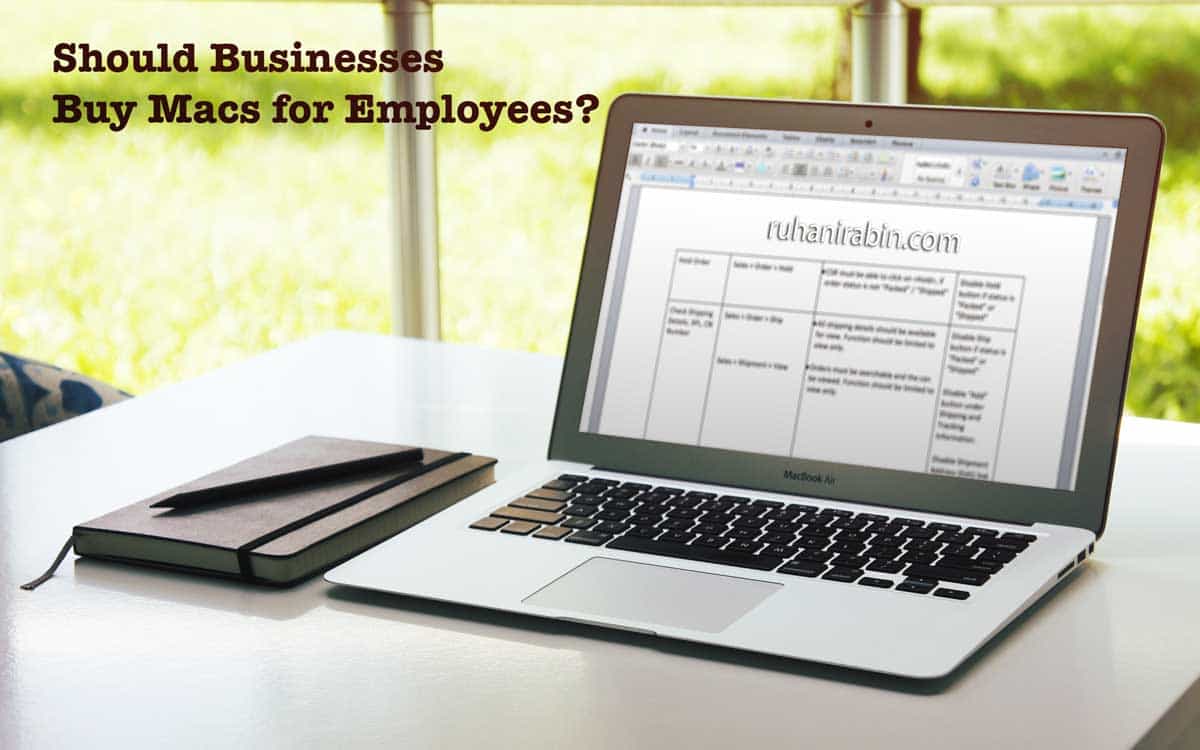Should Businesses Buy Macs for Employees?
As BYOD makes employee technology choice more relevant in the workplace, more enterprises are welcoming Macs within their walls. Macs have a reputation for a more stable operating system, and there are fewer kinds of Mac malware lurking in the wild. Back in 2008, Forrester claimed that for enterprises, Macs were a non-starter. Since then, the research giant has reversed course, telling employers to get ready for a Mac invasion.

Thanks to the popularity of the iPhone and iPad, Apple product usage in the enterprise has doubled over the last three years. However, Apple’s flagship computer, the Mac, has yet to take hold in the enterprise market. Although 60 percent of enterprises support Macs, and it’s a favorite in the high-tech and graphic design communities, most enterprise users still rely on PCs.
As BYOD makes employee technology choice more relevant in the workplace, more enterprises are welcoming Macs within their walls. Macs have a reputation for a more stable operating system, and there are fewer kinds of Mac malware lurking in the wild. Back in 2008, Forrester claimed that for enterprises, Macs were a non-starter. Since then, the research giant has reversed course, telling employers to get ready for a Mac invasion.
Get the Best Updates on SaaS, Tech, and AI
What’s So Special About Macs?
In 2011, Forrester released a report telling big companies that the Mac hordes were coming. David Johnson, Forrester principal analyst, infrastructure and operations, told enterprises that it was time to “repeal prohibition and take decisive action” by making the workplace Mac-friendly. In fact, employees who work with Macs tend to be some of an organization’s most valuable workers. According to Forrester, workers who use Macs tend to be what Forrester calls “HEROes:” Highly Empowered and Resourceful Operatives.
HEROes comprise the 17 percent of workers who, according to Johnson, “use new technologies and find innovative ways to be more productive and serve customers more effectively.” Mac users are also most likely to be what Forrester calls “power laptop users,” who carry at least three devices wherever they go, use more collaboration apps, and make 44 percent more income than other workers.
Macs as Recruiting Tools
 In terms of BYOD, enterprises that used to be PC-only have embraced Mac-friendliness as a recruiting tool. Former General Electric CTO Gregory Simpson implemented an employee choice program for its computers, allowing workers to choose machines from two PC vendors and from Apple. In a world in which GE competes with high-tech firms for top graduates, offering Macs became a recruiting benefit. According to Simpson, the employee computer choice program positioned GE as a contemporary company.
In terms of BYOD, enterprises that used to be PC-only have embraced Mac-friendliness as a recruiting tool. Former General Electric CTO Gregory Simpson implemented an employee choice program for its computers, allowing workers to choose machines from two PC vendors and from Apple. In a world in which GE competes with high-tech firms for top graduates, offering Macs became a recruiting benefit. According to Simpson, the employee computer choice program positioned GE as a contemporary company.
At CBS Interactive, former CTO Peter Yared oversaw a 30 to 35 percent Mac adoption rate within his enterprise. He said that having the choice to use a Mac in the enterprise — on the company’s dime — made employees happier and more productive. Cisco, which used to be a PC-only enterprise, now has nearly 30,000 Macs in addition to 80,000 PCs. These companies, like many others, have noticed what experts call the “iOS halo effect.” The adoption of Apple’s mobile devices tends to pull employees into the Apple ecosystem.
The IT Perspective
For IT departments, Mac adoption is more about interoperability than security. Requiring antivirus for Mac endpoints is a no-brainer, but overall, Mac users experience fewer malware infections. Budgeting for training and help desk support is a crucial component of enterprise Mac adoption, but IT departments that have wrestled with multi-platform enterprise mobility are up to the challenge of Mac integration.
One solution Cisco implemented was a self-support forum exclusively for Mac users. By allowing forum users to troubleshoot with one another, Cisco cut down on calls to the IT help desk. The forums also made Macs more approachable, which drove Mac adoption by employees. Mac self-support proved so popular that the company ended up adopting it for PCs, too. The company also offers self-support for enterprise mobile devices.
Mac Adoption for Business
 Buying Macs for employees won’t automatically turn them into HEROes, but Macs can make a nice perk for current workers and serve as a recruiting tool for prospective employees. The key isn’t necessarily switching to Macs; it’s more about offering employees a choice.
Buying Macs for employees won’t automatically turn them into HEROes, but Macs can make a nice perk for current workers and serve as a recruiting tool for prospective employees. The key isn’t necessarily switching to Macs; it’s more about offering employees a choice.
When workers feel more autonomous, they tend to feel more satisfied with their jobs. People who use Macs tend to have a desire for autonomy according to researchers. Mac users are 13 percent more likely than PC users to say that they want to be unique and “make my own mark.”
They’re also more likely to have four-year college degrees, and they’re 22 percent more likely than PC users to be ages 18 to 34. In other words, if a business wants to attract some of the best new graduates, they should make room for Macs.
Featured Image: Free MacBook Mockup from ninetofive.
Mac and iPad image by William Iven from Unsplash.
MacBook Air on table image by Craig Garner from Unsplash.
FTC Disclosure: The pages you visit may have external affiliate links that may result in me getting a commission if you decide to buy the mentioned product. It gives a little encouragement to a smaller content creator like myself.


